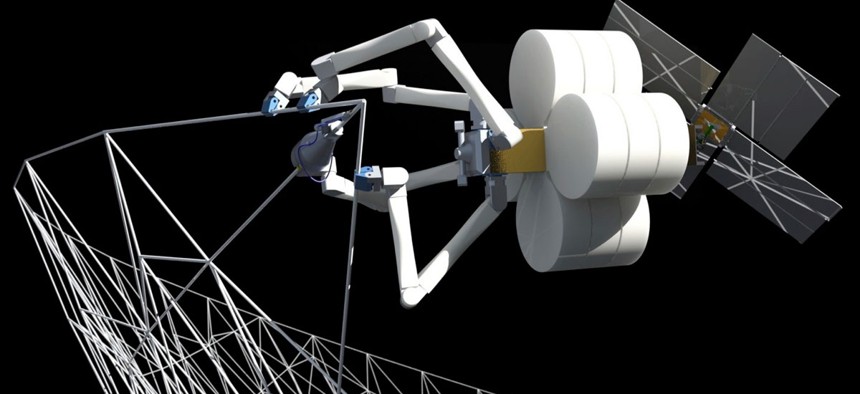Robot Spiders Could Build the Next Generation of Objects in Space

Tethers Unlimited
One of the most difficult parts about constructing satellites, space stations or other orbiting objects is getting the materials into space.
One of the most difficult parts about constructing satellites, space stations, or other orbiting objects is getting the materials into space. For the most part, existing space structures have to be built on Earth. But one company wants to use the ingenuity of spiders to change the way we build for space, reports Space.com.
The idea, which the company, Tethers Unlimited, dubs “SpiderFab,” is to build a multi-limbed robot that could be deployed in space to construct parts of structures, in much the same way earthly spiders construct their webs. The robot would be able to lay out and fuse together carbon fiber rods from a spinneret, crawling along its web of trusses until it creates the final object.
Instead of sending complete structures into space, rockets of the future could fill their payloads with raw materials, which could then be built out by the SpiderFab up in orbit. This would mean more materials could be taken up by one ship. For example, a complete radio antenna would take up more space than the flat-packed sheets of carbon fiber required to build it.

Right now, Tethers Unlimited’s CEO Bob Hoyt (who co-founded the company in the early 1990s to build robotics and communications parts for space and undersea missions) told Space.com he sees space agencies using the SpiderFab to build things like solar panels arrays, radio antennas, and telescope parts, but envisions robots being used in space “to construct the infrastructure in space needed to support humanity’s expansion throughout the solar system.”
Tether Unlimited, which has received funding from NASA for this and a range of other projects, is working on having a prototype of its robo-spinneret ready by the summer, with the intention of launching a functioning spider into space in a few years.
If the development goes smoothly, one day an army of spiders could be used to create the space stations of tomorrow.
NEXT STORY: Army Unveils Cloud Strategy





